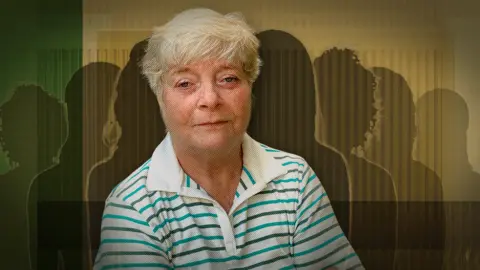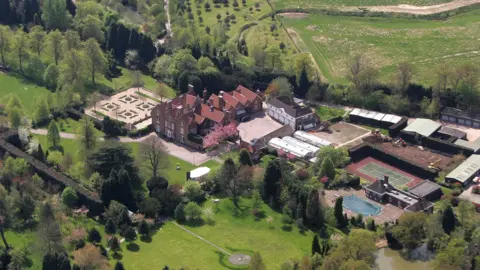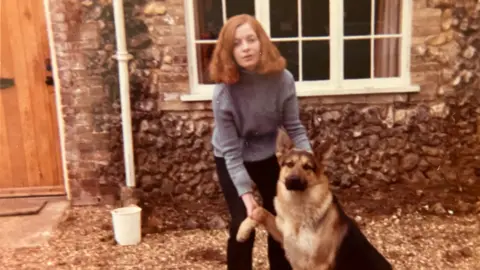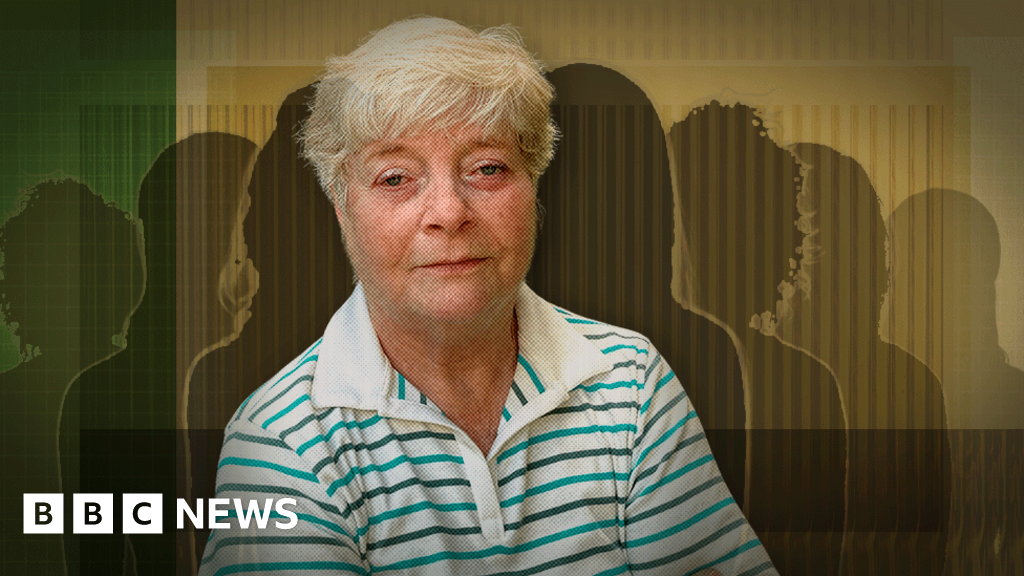 BBC
BBCA further 65 women have contacted the BBC saying they were abused by Mohamed Al Fayed, with allegations stretching far beyond Harrods and as far back as 1977.
Their accounts include new details of sexual harassment, sexual assault and rape, sent to the BBC in the weeks since the documentary Al Fayed: Predator at Harrods was broadcast.
They suggest Al Fayed, who died last year, used a broader range of abuse tactics and also targeted women employed outside his businesses.
Several of the women interviewed by the BBC allege they were recruited by Al Fayed under false pretences into roles on the billionaire’s domestic staff and were then sexually exploited by him – including at his mansion in Oxted.
In the earliest accusation of abuse which the BBC has heard, a woman says she was assaulted by Al Fayed in Dubai in 1977, eight years before his purchase of Harrods helped him become a household name in the UK.
She describes Al Fayed personally stalking and threatening her. Women who worked at Harrods say he later carried out similar intimidation tactics through a team of security staff.
Of the 65 women who contacted the BBC to share their accounts of abuse, 37 of these say they had worked at Harrods.
In response to the BBC’s inquiries, Harrods told us: “Since the airing of the documentary, so far there are 200+ individuals who are now in the Harrods process to settle claims directly with the business.”
The BBC has also spoken to women who were not employed by Al Fayed who say that they were approached and assaulted by him.
One woman said she was working at a London flower shop in the early 1980s, when she was spotted by one of Al Fayed’s team. Then aged 21, she says she was flown to the Paris Ritz for a purported job interview, where Al Fayed sexually assaulted her.
A former BBC make-up artist also said she was sexually assaulted by Al Fayed when she was working on an episode of the Clothes Show in 1989, in which the billionaire was interviewed at Villa Windsor, his home in Paris.
Warning: this story contains details some may find distressing
Oxted mansion: ‘I was kept as a prisoner’
Margot, whose name we have changed, was 19 when she responded to a job advertisement in The Lady magazine in 1985, for a position as a nanny and governess in Surrey. She submitted her application and a photo as requested.
Having worked as a nanny before, she remembers finding it odd that she was asked at the end of her interview “if I had a boyfriend or if I’ve ever had a boyfriend”.
“I said no…[The interviewer] looked relieved about it,” she told the BBC.
It was not until she was offered the job that she was told the role was with Al Fayed and his family, at their Barrow Green Court mansion in Oxted. Her mother encouraged her to try a one-month trial.
“I remember being driven in a chauffeured limousine through the incredibly impressive entrance gates to Barrow Green Court and the long driveway up to a massive brick house,” she says.
Inside, Margot says she was shown to a small, dimly lit room – which had a single bed, a desk and an internal telephone.
 Getty Images
Getty ImagesShe soon learned to fear the sound of it ringing and Al Fayed summoning her. Expecting to see the children, she would arrive to find him alone. This is when she says the repeated sexual assaults started.
“The job just didn’t exist. He didn’t need a nanny. He didn’t want a nanny,” she told the BBC.
For five days, Margot says she only saw the children twice and was not allowed to interact with them. Instead each time she was requested by Al Fayed, she says she was sexually assaulted by him – in different locations on the estate, including the indoor pool, gardens and study.
She felt trapped. “Once you get in the house, you can’t get out. You have to go down a long driveway and through big gates at the bottom. He’s got to give permission for the gates to open,” Margot told the BBC.
In the early hours one morning, she says Al Fayed came into her room, got into her bed, pressed her against the wall, and raped her vaginally and anally.
After he left her room, she immediately packed her case and told Al Fayed later that day that she wanted to leave and did not understand why she was there. But he refused and told her the job description would “become much clearer with time”.
He told her to give it 24 more hours, that he was going to buy her a house and give her more money. She says he got very angry when she again told him she wanted to leave.
 Shutterstock
Shutterstock“I was kept at Barrow Green Court, against my will, as a prisoner for several days and still feel that I was very lucky to escape.”
She says eventually he let her leave, but as she went a staff member told her to “say nothing about my time here, or my life would become very difficult”.
“Looking back, I believe I was recruited purely as a potential sex partner or plaything for Al Fayed, hence the questions at the interview to establish if I was a virgin,” Margot says.
“The events of that week have affected me ever since, I am not the same trusting person anymore and I never will be.”
The BBC has also heard accounts from other women who say they were recruited as nannies, chefs and maids who say they were abused at his private residences. They too say that when they arrived the jobs seemed non-existent and believe that they were hired under false pretences.
Dubai: ‘Was I the start?’
When the news broke about abuse allegations against Al Fayed, memories that Sheenagh had tried to forget for 47 years resurfaced. She has waived her right to anonymity to share her story.
“I was hearing dates but it was before that. I was before that,” she told the BBC. She started to wonder: “Was I the start?”
Sheenagh was 25 and working in a bank in Dubai when she first met Al Fayed, after relocating there for her husband’s construction job.
She says his visits as a customer became more regular and he started to enquire about her personal life and career history, before offering a meeting about a potential job with him.
 Handout
HandoutAs she sat on the other side of the desk to him, in his office down the road, Sheenagh says he started to walk around and came up behind her.
“As I turned the hands came over my shoulders. His hands were everywhere,” she says.
Sheenagh says Al Fayed sexually assaulted her and when she tried to leave blocked the door.
She says she slapped him and finally managed to get past him, but that he told her: “You may come to regret that.”
Sheenagh says Al Fayed then continually stalked her, turning up at her workplace, the supermarket and her social club, repeating his parting words.
“The threat was there all the time,” she says.
“On one occasion he said, ‘I warned you you’d regret it… have you noticed that I’m always there?’”
Sheenagh says this happened around 20 times and on some occasions he would follow and grope her again.
 Getty Images
Getty Images“I kept praying that somebody else would actually see this happen, thinking if somebody else sees it happen it’s real and somebody will do something,” she adds.
She says he had an awful hold over her, until he seemed to disappear. Later, she found out he had left Dubai and she felt like she could breathe again.
It was only in 2015, when her late ex-husband’s health started to deteriorate that she finally told him what happened.
“I told him because I knew he was getting towards the end of his life. And I felt he needed to know. Because it was the only secret that I’d ever kept from him.”
Sheenagh says what happened makes her angry now, and her biggest regret is not coming forward sooner before Al Fayed died.
- If you have been affected by any of the issues raised in this story you can visit BBC Action Line.
Additional reporting by Helena Wilkinson


